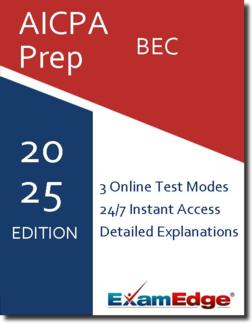AICPA BEC (BEC) Practice Tests & Test Prep by Exam Edge - FAQ
Based on 20 Reviews
- Real Exam Simulation: Timed questions and matching content build comfort for your AICPA BEC test day.
- Instant, 24/7 Access: Web-based AICPA Business Environment and Concepts practice exams with no software needed.
- Clear Explanations: Step-by-step answers and explanations for your AICPA exam to strengthen understanding.
- Boosted Confidence: Reduces anxiety and improves test-taking skills to ace your AICPA Business Environment and Concepts (BEC).

Why should I use Exam Edge to prepare for the AICPA Business Environment and Concepts Exam?
FAQ's for Exam Edge AICPA Business Environment and Concepts practice tests
- Comprehensive content: Exam Edge's AICPA Business Environment and Concepts practice tests are created specifically to prepare you for the real exam. All our AICPA BEC practice test questions parallel the topics covered on the real test. The topics themselves are covered in the same proportions as the real test too, based on outlines provided by the American Institute of Certified Public Accountants in their AICPA BEC test guidelines.
- Realistic practice: Our AICPA BEC practice exams are designed to help familiarize you with the real test. With the same time limits as the real exam, Our AICPA practice tests enable you to practice your pacing and time management ahead of test day.
- Detailed explanations: As you complete your practice tests, we show you which questions you answered correctly and which ones you answered incorrectly, in addition to providing you with detailed step-by-step explanations for every single AICPA Business Environment and Concepts practice exam question.
- Performance insights: After you complete a practice test, we provide you with your raw score (how many you answered correctly) and our estimate of the AICPA BEC score you would have received if you had taken the real test.
- Ease of access: Because all Our AICPA practice tests are web-based, there is no software to install. You can take AICPA BEC practice exams on any device with access to the internet, at any time.
- Flexible use: If you must pause while taking one of Our AICPA practice exam, you can continue right where you left off. When you continue the test, you will start exactly where you were, and with the same amount of time you had remaining.
- Thousands of unique questions: We offer 5 different online practice exams with 500 unique questions to help you prepare for your AICPA Business Environment and Concepts !
- Low cost: The cost of ordering 5 practice tests is less than the cost of taking the real AICPA BEC test. In other words, it would be less expensive to order 5 practice tests than to retake the real AICPA Business Environment and Concepts exam!
- Our trusted reputation: As a fully accredited member of the Better Business Bureau, we uphold the highest level of business standards. You can rest assured that we maintain all of the BBB Standards for Trust.
- Additional support: If you need additional help, we offer specialized tutoring. Our tutors are trained to help prepare you for success on the AICPA Business Environment and Concepts exam.
What score do I need to pass the AICPA BEC Exam?
To pass the AICPA Business Environment and Concepts test you need a score of .
The range of possible scores is 0 to 100.
How do I know the practice tests are reflective of the actual AICPA Business Environment and Concepts ?
At Exam Edge, we are proud to invest time and effort to make sure that Our AICPA practice tests are as realistic as possible. Our practice tests help you prepare by replicating key qualities of the real test, including:
- The topics covered
- The level of difficulty
- The maximum time-limit
- The look and feel of navigating the exam
Do you offer practice tests for other American Institute of Certified Public Accountants subjects?
Yes! We offer practice tests for 4 different exam subjects, and there are 20 unique exams utilizing 2000 practice exam questions. Every subject has a free sample practice test you can try too!
AICPA Auditing and Attestation
(AUD
®
)
Practice Tests
AICPA Business Environment and Concepts
(BEC
®
)
Practice Tests
AICPA Financial Accounting and Reporting
(BEC
®
)
Practice Tests
AICPA Regulation
(REG
®
)
Practice Tests
To order tests, or take a sample test, for a different subject:
Click on ' Name on the Exam Name' You will be take to the orders page
How do I register for the real American Institute of Certified Public Accountants?
For up-to-date information about registration for the American Institute of Certified Public Accountants, refer to the American Institute of Certified Public Accountants website.


